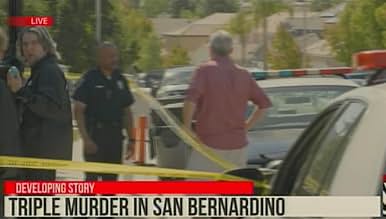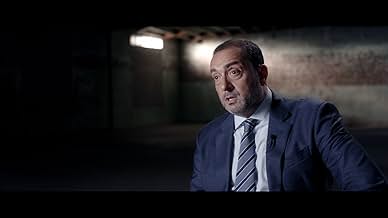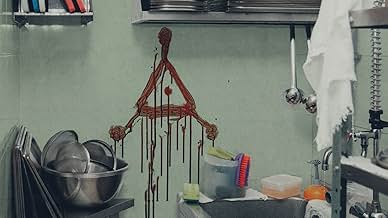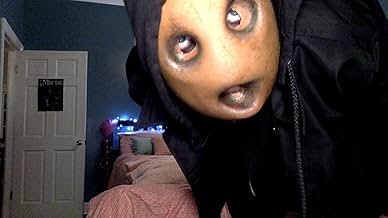Um mockumentário de crimes reais sobre a perseguição por dois detetives de um assassino em série chamado Mr. Shiny, que aterrorizou o sul da Califórnia por quase duas décadas.Um mockumentário de crimes reais sobre a perseguição por dois detetives de um assassino em série chamado Mr. Shiny, que aterrorizou o sul da Califórnia por quase duas décadas.Um mockumentário de crimes reais sobre a perseguição por dois detetives de um assassino em série chamado Mr. Shiny, que aterrorizou o sul da Califórnia por quase duas décadas.
- Direção
- Roteirista
- Artistas
- Prêmios
- 2 vitórias e 1 indicação no total
Avaliações em destaque
Strange Harvest had so much promise, blending its true crime element seamlessly into an eerie, gripping story. For most of the runtime, I was hooked with the pacing, atmosphere, and slow-burn tension were top notch. Unfortunately, the ending completely fizzled. There's barely any satisfying conclusion, and not even a clever final twist to leave on a high note. It's such a shame, because the rest was so strong. A 6/10 for me. Worth watching, but the final moments left me more frustrated than thrilled.
"Strange Harvest" is a mockumentary that follows two San Bernardino police officers and their decades-long investigation into the case of "Mr. Shiny," a brutal serial killer whose sadistic crimes come to take on occult-like features.
Largely consisting of interviews with the officers, witnesses, and experts involving in the various crimes, "Strange Harvest" very much represents a "Dateline" or "20/20" true crime documentary, albeit a much more graphic and, eventually, fantastical one. Like many of its type, the film plays under the guise of being a "true story," a conceit that we know is a gimmick, but one that I will at least accept for entertainment's sake.
What this film excels it as it capturing the tone and feel of the true crime documentaries that litter nighttime television and major streaming services. From the editing, to the interview formats, to the police and surveillance footage, "Strange Harvest" is an admirable facsimile. The performances and dialogue are also, of the most part, reasonable effective and naturalistic enough to provide functional storytelling; with a film like this, I sometimes find it difficult to suspend my disbelief, but I can say that it came just about as close to "real"-feeling as any other mockumentary I've seen.
"Strange Harvest" owes a lot to films like "The Poughkeepsie Tapes" and the crimes profiled have echoes of "Seven" as well as footnotes referencing things like the Zodiac Killer. For true crime buffs, the film is a fairly entertaining odyssey through an outrageous series of murders--almost so outrageous that it at times stretches credulity--but the pacing and presentation manage to hold it together nonetheless.
The graphic photographs and footage scattered throughout are at times bone-chilling, as are the sequences in which we see the killer either in still image or video. As the film ramps up toward its conclusion, things get admittedly hokier and cosmic, with an H. P. Lovecraft bent to the crimes. Unfortunately, none of this totally gels, and the implications get a bit too silly for their own good.
Even still, I feel "Strange Harvest" is worth seeking out if you are a true crime documentary devotee or enjoy the mockumentary format. It may not revolutionize the genre, but it is a formidable indie film with a number of chilling moments, and it recreates the true crime documentary genre with an admirable amount of realism (despite the more fantastical wiring revealed to be underneath the floorboards). 6/10.
Largely consisting of interviews with the officers, witnesses, and experts involving in the various crimes, "Strange Harvest" very much represents a "Dateline" or "20/20" true crime documentary, albeit a much more graphic and, eventually, fantastical one. Like many of its type, the film plays under the guise of being a "true story," a conceit that we know is a gimmick, but one that I will at least accept for entertainment's sake.
What this film excels it as it capturing the tone and feel of the true crime documentaries that litter nighttime television and major streaming services. From the editing, to the interview formats, to the police and surveillance footage, "Strange Harvest" is an admirable facsimile. The performances and dialogue are also, of the most part, reasonable effective and naturalistic enough to provide functional storytelling; with a film like this, I sometimes find it difficult to suspend my disbelief, but I can say that it came just about as close to "real"-feeling as any other mockumentary I've seen.
"Strange Harvest" owes a lot to films like "The Poughkeepsie Tapes" and the crimes profiled have echoes of "Seven" as well as footnotes referencing things like the Zodiac Killer. For true crime buffs, the film is a fairly entertaining odyssey through an outrageous series of murders--almost so outrageous that it at times stretches credulity--but the pacing and presentation manage to hold it together nonetheless.
The graphic photographs and footage scattered throughout are at times bone-chilling, as are the sequences in which we see the killer either in still image or video. As the film ramps up toward its conclusion, things get admittedly hokier and cosmic, with an H. P. Lovecraft bent to the crimes. Unfortunately, none of this totally gels, and the implications get a bit too silly for their own good.
Even still, I feel "Strange Harvest" is worth seeking out if you are a true crime documentary devotee or enjoy the mockumentary format. It may not revolutionize the genre, but it is a formidable indie film with a number of chilling moments, and it recreates the true crime documentary genre with an admirable amount of realism (despite the more fantastical wiring revealed to be underneath the floorboards). 6/10.
Saw this at Nevermore Film Festival in Durham, NC. This film nails the true-crime documentary format, with two hard-boiled detectives relating the story of how they worked to track down a serial killer in San Bernardino County, CA. It's like an extended edition of Dateline crossed with horror, and that's a grand compliment.
There are a lot of killings for the detectives to describe, but leads Peter Zizzo (Det. Joe Kirby) and Terri Apple (Det. Alexis 'Lexi' Taylor) keep it intensely interesting. Their sincere performance helps ground the film, which has a lot of pretty horrifying details to relate.
Although their testimony are mostly filmed seated (separately) in a studio, there are plenty of on-site details of the murders, and insightful and realistic interviews with the people who knew the victims.
The identity of the killer, who calls himself Mr. Shiny, and his reason for his killing spree is kept partially unknown to us until late in the film, which helps slowly ratchet up the suspense from beginning to end.
The film is quite gory, as it doesn't shy away from showing us the aftermath of the murders, each grisly in its own warped way.
When you realize the real reason for the murders (which you might guess sooner than I), the film takes on another dimension of fright.
To finish, if you like police procedurals, but find them too tame, this fictional account is a remarkable likeness of the format, as long as you're ready for some disturbing images.
There are a lot of killings for the detectives to describe, but leads Peter Zizzo (Det. Joe Kirby) and Terri Apple (Det. Alexis 'Lexi' Taylor) keep it intensely interesting. Their sincere performance helps ground the film, which has a lot of pretty horrifying details to relate.
Although their testimony are mostly filmed seated (separately) in a studio, there are plenty of on-site details of the murders, and insightful and realistic interviews with the people who knew the victims.
The identity of the killer, who calls himself Mr. Shiny, and his reason for his killing spree is kept partially unknown to us until late in the film, which helps slowly ratchet up the suspense from beginning to end.
The film is quite gory, as it doesn't shy away from showing us the aftermath of the murders, each grisly in its own warped way.
When you realize the real reason for the murders (which you might guess sooner than I), the film takes on another dimension of fright.
To finish, if you like police procedurals, but find them too tame, this fictional account is a remarkable likeness of the format, as long as you're ready for some disturbing images.
Strange Harvest is a fascinating hybrid on paper a horror mockumentary that merges the unsettling realism of true crime with the creeping dread of a slasher film. Directed by Stuart Ortiz (Grave Encounters), the film chronicles the return of a long-dormant serial killer known as "Mr. Shiny," who resurfaces in Southern California's Inland Empire after a 20-year absence. Told through interviews with detectives, witnesses, and survivors, the story unfolds much like a Netflix docuseries or an Investigation Discovery special, but with the menace of a fictional monster lurking between the lines.
If you're a fan of the ID Channel or Netflix crime documentaries especially those built on talking head interviews, crime scene photos, and slow burn narrative reveals this movie is squarely in your wheelhouse. Ortiz nails the structure of a prestige docuseries, right down to the ominous voiceovers, grainy police footage, and staged reenactments that look just believable enough to make you forget you're watching a scripted film. The two lead detectives, played with grit and weary realism, give the story a grounded center, and the Inland Empire setting brings a sun-bleached, suburban eeriness to the proceedings.
That said, while the format is well executed, it's also limiting. There's a compelling protagonist here, and Mr. Shiny himself is an intriguing, cryptic villain-but the rigid docu-style storytelling keeps them both at arm's length. We're always watching them through someone else's filter, rather than fully inhabiting their world. The horror elements, when they arrive, are effective but sparse, sometimes feeling like they're spliced in rather than organically growing from the story.
This is where Strange Harvest may divide audiences. For true crime devotees, the authenticity and attention to procedural detail will be a treat. For horror fans looking for immersive tension or sustained scares, the docu-style pacing might feel like a slow drip that never fully erupts. And for viewers like me, who see the potential in the premise but want more than just a convincing imitation of a streaming documentary, it's hard not to wish the film broke free of its own structure.
Ultimately, Strange Harvest is a well crafted experiment that succeeds at what it's trying to do-recreate the feeling of a prestige true-crime do, but in doing so, it may have boxed itself in. It's a film that feels almost too convincing for its own good, leaving you wondering if the same story might have worked better told without the mockumentary constraints.
If you're a fan of the ID Channel or Netflix crime documentaries especially those built on talking head interviews, crime scene photos, and slow burn narrative reveals this movie is squarely in your wheelhouse. Ortiz nails the structure of a prestige docuseries, right down to the ominous voiceovers, grainy police footage, and staged reenactments that look just believable enough to make you forget you're watching a scripted film. The two lead detectives, played with grit and weary realism, give the story a grounded center, and the Inland Empire setting brings a sun-bleached, suburban eeriness to the proceedings.
That said, while the format is well executed, it's also limiting. There's a compelling protagonist here, and Mr. Shiny himself is an intriguing, cryptic villain-but the rigid docu-style storytelling keeps them both at arm's length. We're always watching them through someone else's filter, rather than fully inhabiting their world. The horror elements, when they arrive, are effective but sparse, sometimes feeling like they're spliced in rather than organically growing from the story.
This is where Strange Harvest may divide audiences. For true crime devotees, the authenticity and attention to procedural detail will be a treat. For horror fans looking for immersive tension or sustained scares, the docu-style pacing might feel like a slow drip that never fully erupts. And for viewers like me, who see the potential in the premise but want more than just a convincing imitation of a streaming documentary, it's hard not to wish the film broke free of its own structure.
Ultimately, Strange Harvest is a well crafted experiment that succeeds at what it's trying to do-recreate the feeling of a prestige true-crime do, but in doing so, it may have boxed itself in. It's a film that feels almost too convincing for its own good, leaving you wondering if the same story might have worked better told without the mockumentary constraints.
True-crime programs on TV wish they could be this good.
Like Fenômenos Paranormais (2011) before it, Strange Harvest dissects a type of TV program and creates an imitation even better than the original. This is O Silêncio dos Inocentes (1991) as an episode of Detetives médicos (1996), a sinister episode of Lei & Ordem (1990) taken to its horrific logical extreme.
I saw Strange Harvest at the Nevermore Film Festival. It's a simple, low budget portrayal of a straightforward premise (at least until the end), yet masterfully executed. Peter Zizzo and Terri Apple are quite believable as average suburban police detectives pursuing what they uncover to be an extraordinary crime spree. By telling the story in chronological order, the audience knows what the detectives knew at the time and share their confusion in trying to make sense of the crimes, the lack of evidence, and their frustration in trying to identify the perpetrator and track him down because he disappears like a ghost. Each crime is different, and one in particular in a swimming pool is as diabolical as the traps in the Jogos Mortais (2004) movies.
A Bruxa de Blair (1999), the mother of all found footage films, used its documentary film style to seem totally real. Strange Harvest creates a similar fake reality that makes the audience feel like they're learning about an incident that really happened. The story's simplicity and its streamlined portrayal make it all the more convincing. I've watched a lot of big budget horror movies that aren't nearly as compelling as Strange Harvest.
There's an extra scene after the credits, be sure to stay for that.
Like Fenômenos Paranormais (2011) before it, Strange Harvest dissects a type of TV program and creates an imitation even better than the original. This is O Silêncio dos Inocentes (1991) as an episode of Detetives médicos (1996), a sinister episode of Lei & Ordem (1990) taken to its horrific logical extreme.
I saw Strange Harvest at the Nevermore Film Festival. It's a simple, low budget portrayal of a straightforward premise (at least until the end), yet masterfully executed. Peter Zizzo and Terri Apple are quite believable as average suburban police detectives pursuing what they uncover to be an extraordinary crime spree. By telling the story in chronological order, the audience knows what the detectives knew at the time and share their confusion in trying to make sense of the crimes, the lack of evidence, and their frustration in trying to identify the perpetrator and track him down because he disappears like a ghost. Each crime is different, and one in particular in a swimming pool is as diabolical as the traps in the Jogos Mortais (2004) movies.
A Bruxa de Blair (1999), the mother of all found footage films, used its documentary film style to seem totally real. Strange Harvest creates a similar fake reality that makes the audience feel like they're learning about an incident that really happened. The story's simplicity and its streamlined portrayal make it all the more convincing. I've watched a lot of big budget horror movies that aren't nearly as compelling as Strange Harvest.
There's an extra scene after the credits, be sure to stay for that.
Você sabia?
- CuriosidadesThe film supposedly had many uses of ai generated images when it premiered at festivals, however, as of the the films official theatrical release all AI generated images were replaced by real photos.
- Erros de gravaçãoDuring one of the scenes mimicking a local TV broadcast, the temperature appears as 74°C, which would be about 165°F.
- Cenas durante ou pós-créditosThere's a bonus scene after the credits.
Principais escolhas
Faça login para avaliar e ver a lista de recomendações personalizadas
Detalhes
Bilheteria
- Faturamento bruto nos EUA e Canadá
- US$ 390.877
- Fim de semana de estreia nos EUA e Canadá
- US$ 223.208
- 10 de ago. de 2025
- Faturamento bruto mundial
- US$ 390.877
- Tempo de duração
- 1 h 34 min(94 min)
Contribua para esta página
Sugerir uma alteração ou adicionar conteúdo ausente






































![Manuela Velasco in [REC] (2007)](https://m.media-amazon.com/images/M/MV5BNTJiYjhkM2YtNjU0MC00MzMwLWE1ODktMGFkZWM3NTk4NDdkXkEyXkFqcGc@._V1_QL75_UX500_CR0)
